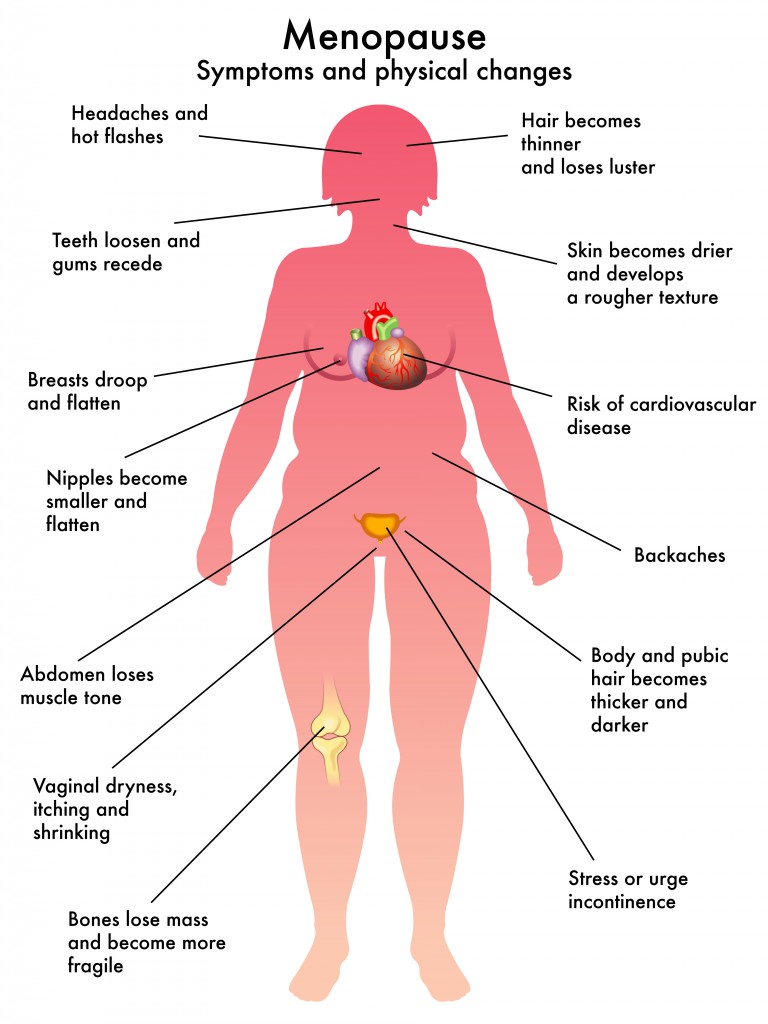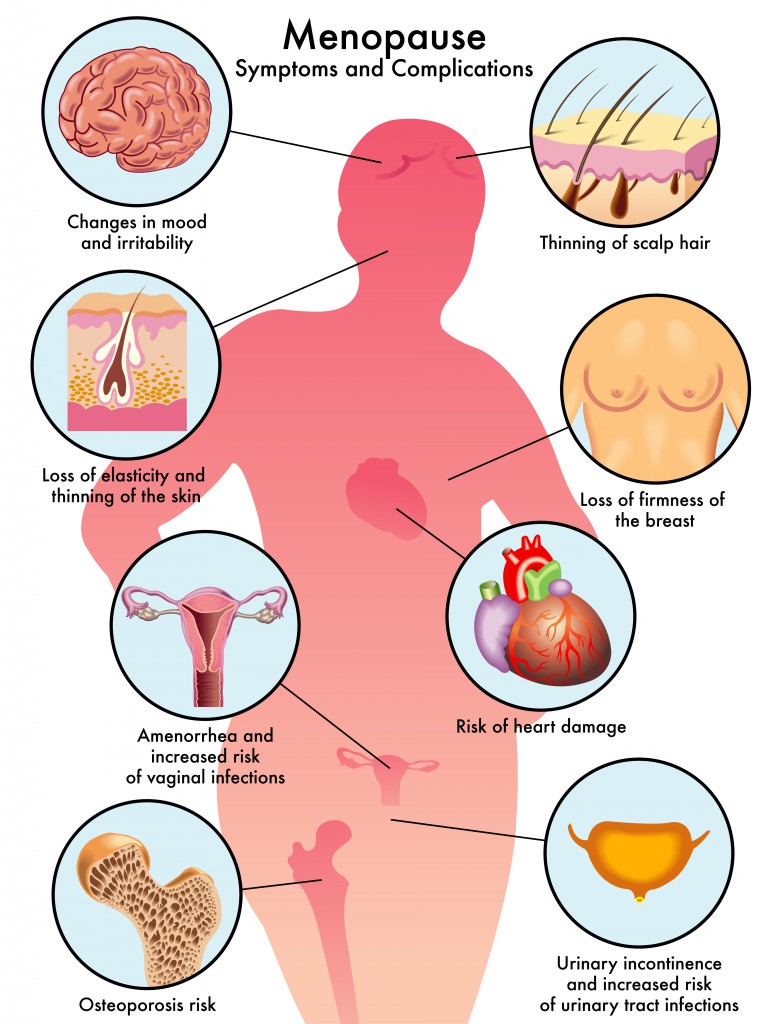In our culture, menopause can best be defined as the cessation of menstrual periods and fertility in an adult female. Often called the change of life, the word, menopause, actually means just that—the end of monthly cycles.
However, this very simple definition of a natural body process requires a good deal more explanation to thoroughly understand what is actually happening in a woman’s body.
Menopause Causes
When menopause occurs, the ovaries cease to produce eggs, which previously could result in pregnancy if fertilized. This happens because the body is producing lower levels of estrogen and other hormones that control female characteristics, such as breast development, menstrual cycles, body hair, etc. Hormone loss can be responsible for any number of uncomfortable or debilitating problems, relating to many different parts of the body.
Alternative Names
Most women experience their last period sometime between the ages of 40 and 60, with the average age being about 5l years. Menopause is said to specifically occur when a woman has been free of menstruation for a period of 12 months. Until that time, she is considered to be in perimenopause, a time span of up to 10 years in which menstrual irregularities and menopausal symptoms may occur.
Menopause? Get Remedies Fast!
A woman can also enter into surgical menopause at any age, if the ovaries are removed as part of a hysterectomy. When only the uterus is surgically removed, and the ovaries are left intact, estrogen and other hormones continue to be produced until natural menopause occurs in mid-life. Chemotherapy, as well as some auto-immune diseases, can also lead to surgical menopause.
Test and Diagnosis Considerations
Diagnosing menopause is relatively easy to do, and identifying specific stages and symptoms is usually not a problem either. Generally, doctors use medical history and symptoms to diagnose the onset of menopause. A blood test to measure the follicular hormone and estrogen levels in the blood can be done, but it is not a definite indicator of menopause. Obviously, doctors will do other tests to rule out certain illnesses if symptoms are severe. For example, neurological tests might be called for if memory lapses seem extreme.
It would seem that such a natural body process would be a somewhat painless and easy transition for most women. Unfortunately, the opposite is true. Studies show that up to 85% of menopausal women experience hot flashes, one of the most common, though certainly not the most serious of symptoms. True, some can sail through the period with minimal problems, but some experience these symptoms for the rest of their lives.
Menopause Symptoms
These symptoms can be many and varied, and sometimes it might seem that almost anything can be blamed on menopause. The important issue here is that menopause is a function of the endocrine system, and thus, the entire body is affected, not just a woman’s reproductive parts. Let’s look at a list of probable and common symptoms, and the areas of the body that are involved:
Reproductive Problems
- Decrease in sexual appetite
- Vaginal dryness
- Breast tenderness
Mental Problems
- Memory loss
- Depression
- Concentration difficulties
- Irritability
- Bouts of forgetfulness
- Fuzziness
- Anxiety
General Aches and Pains
- Headaches
- Hair loss
- Joint pain
- Digestive troubles
- Urinary tract problems
- Weight gain
- Difficulty sleeping
- Hot flashes
- Night sweats
- Fatigue
- Heart palpitations
- Osteoporosis
Of course, one might argue that some symptoms would gradually lead to the surfacing of others. For example, if one is prone to sleep loss, then irritability and loss of concentration might result. Any or all of these symptoms could lead to depression, and so on. However, when one considers that menopause is supposed to be a natural body process, it does seem rather overwhelming that all these unpleasant side effects can and do occur!
Risk Factors
Since all women who live into their middle years and beyond will experience menopause, it is in their best interests to be informed about the various remedies for these symptoms. Basically, the remedies fall into four categories: Healthy Living, Home and Herbal Remedies, Further Alternative Treatments, and Drugs and Pharmaceuticals. The first three categories are the most preferred by the medical community, as the fourth one renders the highest risks and costs. Let’s examine each category and look at specific treatments for some of the symptoms.
Healthy Living & Prevention Tips
This category carries the lowest risk, and would be beneficial to anyone, including the menopausal woman. Obviously, there is nothing anyone can do to prevent menopause from occurring, but adopting a healthy lifestyle can do a lot to ease the transition into this new era.
- A low-fat, high-fiber diet that is rich in fruits and vegetables will help maintain balance and help your body to resist those extra 10-15 pounds that often appear during menopause. Drinking lots of water will also help with dryness issues and keep you hydrated.
- Specific foods that help to promote estrogen production are soy, beets, carrots, alfalfa, apples, cabbage and papaya. Eating these foods within a well-balanced diet can help with hot flashes and night sweats.
- Exercise is key to a healthy routine. Walking, jogging, swimming or jumping rope are all simple exercises that cost little, if anything. Yoga and meditation are also excellent, and can help with depression and sleeplessness.
- Avoid alcohol and caffeine as much as possible. If you smoke, stop.
- Make sure that you are getting adequate amounts of vitamins and minerals in your diet, and/or supplements that you take. Vitamins B, C, D and E are especially important for good bone, skin, eye and brain health. Calcium is your best weapon against osteoporosis.
- Try to consistently get 7-8 hours of sleep every night. This will ensure your overall well-being and help with memory problems, irritability and depression.
- Pamper yourself a bit. Treat yourself to a day at the spa, a manicure or a new hairstyle. Shopping can also be very therapeutic and mood-elevating.
- Seek out some new activities or interests. Get together with an old friend, or plan a party. Join a book club, or get involved with church activities—do something new and different, and you won’t have time to be depressed!
Treatment Options – Home and Herbal Remedies
When we look at this category, it seems easiest to divide the remedies into three groups: those that help with general aches and pains, those that help alleviate sexual dysfunction, and those that aid in dealing with memory problems and depression. The herbal remedies fall into two categories: non-estrogenic and phytoestrogens. Non-estrogenic herbs do not produce estrogen, but provide a supportive climate for hormonal glands so that they produce more estrogen. The phytoestrogens, like Black Cohosh, actually do produce estrogens.
Remedies for general aches and pains
By far, the most common complaint among menopausal women is hot flashes and/or night sweats. The drop in estrogen directly affects the hypothalamus, that area of the brain that controls body temperature. Blood vessels then dilate to try to control the heat, and profuse sweating and red, flushed skin are not unusual. Many women report wanting to tear off their clothes to relieve the discomfort. These remedies have been found to be somewhat effective, and not quite as drastic:
- 20-60 mg. of Black Cohosh

- Licorice powder
- Soy (Soy nuts, tofu, tempeh, soy milk, etc.)
- 3-4 gr of Chinese angelica tea (Dong quai)
- Fruits and vegetables rich in vitamin C (broccoli, melons, berries, apricots, etc.)
- Evening primrose oil
- Wear cotton clothing to bed
- Dress in layers
- Use air conditioning in summer
- Determine what triggers hot flashes and try to avoid (for example: alcohol, caffeine, etc.)
- Drink a bottle of beer (The hops contain phytoestrogens)
Another common complaint during menopause involves sleep disorders, which generally translates into a lack of sleep. It is estimated that almost 60% of menopausal women experience insomnia at some point. Some of this may be due to the aforementioned hot flashes and night sweats, in which case some of the remedies for those things might help with the sleep issues. Apparently the fluctuations in hormone levels are what cause the sleeplessness—kind of like a ragtime band where one instrument hits a wrong note causing the entire band to be thrown off course.
Here are some remedies that can be effective when dealing with insomnia:
- Try to keep as normal a sleep routine as possible. Rise and go to bed at the same time every day.
- Keep the bedroom cool and dark.
- Use your bed for sleeping, not watching television or playing video games.
- Exercise as often as possible. Yoga is particularly effective in helping you to relax.
- Avoid alcohol, nicotine and caffeine later in the day.
- Eat a low-fat diet, and avoid foods that are high in carbohydrates late in the day.
- Drink warm milk or chamomile tea before going to bed.
- Dress in “cool” night clothes.
If things don’t improve, see your doctor or a sleep disorder specialist.
Osteoporosis

Osteoporosis is a serious disease that involves loss of bone mass. Because the bones are weakened, they become brittle and fractures may easily occur, sometimes affecting life style and life expectancy. Menopausal women are at increased risk for osteoporosis because they have stopped producing large amounts of estrogen, which protects the body from bone loss.
Preventive measures, or remedies to offset osteoporosis, should begin well before the onset of menopause. Taking 600 mg. of calcium with vitamin D twice a day, should probably begin when a woman enters her 40’s. Other remedies would include:
- Exercising regularly. Weight-bearing exercise is particularly beneficial.
- Not smoking, or stopping if you do.
- Eating a balanced diet, rich in calcium and green, leafy vegetables.
- Drinking alcohol not at all or in moderation.
Remedies for Sexual Dysfunction
One of the most debilitating effects of a lack of estrogen can be vaginal dryness. This can create a great deal of physical discomfort for a woman in a sexual relationship, as well as damage her self esteem. Hormonal changes can affect the walls of the vagina and the glands that provide lubrication, thus making intercourse a painful experience. Many strides have been made in this area, and the remedies listed below may be helpful:
Several gels on the market can alleviate dryness. Some of the brands are Astroglide, Koromex and K-Y Jelly. Surgical gels are also a good choice as they help prevent bacterial infection.
Gyne-Moistrin and Replens are creams that actually plump, or provide moisture to the vaginal cells, thus relieving dryness. They can be used both internally and externally to provide more comfort during intercourse.
- Prescription hormonal creams and pills will be discussed in the Drug and Pharmaceutical category.
- Vitamins A and E are important in maintaining vaginal health.
- Vitamin E can also help with breast tenderness.
- A Calendula douche can be helpful in treating vaginal dryness.
- The urinary tract and vaginal muscles can be strengthened with pelvic floor exercises.
- Dong Quai and Black Cohosh can help to achieve hormonal balance, thus alleviating dryness.
- Take time to communicate your needs to your partner and be willing to experiment with new ideas in your sexual practices.
Remedies for Depression and Memory Problems
There is little question that all of us experience stress in our daily lives, but when hormones fluctuate during menopause, it can seem overwhelming. It’s no wonder that some women may experience moments of forgetfulness and have difficulty concentrating. Today’s menopausal woman is often a member of the sandwich generation. This refers to raising your own children while taking care of aging parents. Sometimes this occurs in a subsequent fashion, sometimes at the exact same time, but whenever it happens, it certainly adds stress to your life. In addition to all the normal responsibilities that most women shoulder—taking care of family, housekeeping, cooking, working at a job outside the home, financial worries, etc., it is no wonder that many women become depressed when menopause comes along.
There is no magic formula to fix these problems, but here are some remedies that may help:
1. Reach out to others and compare experiences . Join a support group through your church or community, or ask your doctor to recommend one. Studies have shown that support groups can be uplifting and helpful in solving problems or stress-related issues. A support group may also keep you informed about the latest research in specific problem areas. Also, a good online website is Redhotmamas.com.
2. Talk, informally, to other women going through menopause. It helps to not feel alone, and you might stumble on some new ideas that will benefit you. If possible, speak to a woman who is older than you, who has been dealing with menopause for several years.
3. Eat a well-balanced diet, exercise, and try to get 7-8 hours of sleep every night.
4. Certain herbs and minerals can be helpful in improving memory and achieving emotional balance. Vitamins A and B complex and the mineral, Selenium, fall into this category. St. John’s Wort, ginkgo biloba, garden sage and dandelion root also claim to help with depression. Common spices such as garlic, cayenne pepper and ginger seem to have phytoestrogenic properties.
5. Music and dance have proven to be powerful anti-depressants, especially when coupled with aerobic exercise.
6. Exposure to 10-15 minutes of sunlight every day provides emotional and physical benefits.
7. Of course, if you have tried some of these remedies and not had some measure of success, see your doctor. Depression is a serious disease, and should never be taken lightly. Your doctor can determine whether anti-depressant drugs may help, and/or he may refer you to a psychiatrist, psychologist, or other specialist.
Further Alternative Treatments (Supportive Remedies)
Some experts would argue that the following remedies for menopausal discomforts would fit better into the Home and Herbal category, or maybe not in any category at all! However, these practices have been found to be helpful in many instances in reference to pain and supporting emotional well-being. They include:
- Massage
- Acupuncture
- Biofeedback
- Hypnosis
- Aromatherapy
The three categories that we have explored thus far—Healthy Living, Home and Herbal Remedies and Further Alternative Treatments, have almost no, or very little risk, and are relatively inexpensive. The final category, Drugs and Pharmaceuticals, will involve higher risks and greater costs.
Drug and Pharmaceutical Remedies
The most well-known treatment in this final categoy is HRT, or Hormone Replacement Therapy. This provides relief for almost all menopausal symptoms from hot flashes to depression and beyond. Generally speaking, women who have no uterus would be treated with estrogen, and women who still have a uterus would receive estrogen and progestins in a pill or patch form. This was pretty much the Utopia of menopause remedies, but unfortunately, it is now rarely used.
In 2002, the Women’s Health Initiative of the National Institutes of Health completed a study that found that incidences of breast cancer, strokes and heart attacks increased in women that underwent this treatment. Secondary side effects included blood clots, urinary incentinence and gallstones. At this point, the Journal of the American Medical Association recommended that HRT be used for as little time as possible, if at all, in treating menopausal symptoms.
However, Estrogen creams and tablets like Estrace and Vagi-fem are often used to help relieve vaginal dryness and make intercourse more comfortable. Estring is a type of flexible ring that inserts into the vagina to dispense estrogen into the vaginal canal. These medications provide a low dose of estrogen, but it should be noted that some of it is absorbed systemically into other body cells.
Brand Name Drugs
There are now several drugs on the market that are used to treat osteoporosis. Some brand names are Fosamax and Boniva. These drugs are bisphosphonates, which help prevent the breakdown of bones, and thus help to strengthen them. Often they are taken along with calcium and vitamin D. Some side effects include diarrhea, joint pain, weakness and gastric upsets. Injections of these drugs are available for women with esophageal problems.
Menopausal symptoms can be treated with a variety of prescription drugs, some which may seem surprising, given the symptom. For example, Clonidine is usually used to treat high blood pressure, but has been found to be helpful in alleviating hot flashes. Some anti-depressants such as paroxetine and sertraline also make this claim, as does Gabapentin, an anti-seizure drug. And of course, there are many anti-depressants that can be prescribed for mood swings, anxiety and depression.
These drug and phamaceutical treatments carry a higher risk, and generally, come at a higher cost, than the remedies in the first 3 categories. Overall, the medical community seems to feel that a combination of remedies from these categories, using those with the highest risk sparingly, is the best approach to alleviating menopausal discomfort. Research continues in hopes of providing the means to a more comfortable menopausal experience for today’s woman.



1 Comment
Fabulous stuff, Ms. Wang! I have found information on some of these remedies scattered over the internet but never all pulled together in such a concise, informative, and easy to read website as yours. *Thank you* for creating this site – gathering information on conditions, and learning what remedies are available, both home and pharmaceutical, is so much faster and easier, now. I will certainly be a regular visitor. 🙂